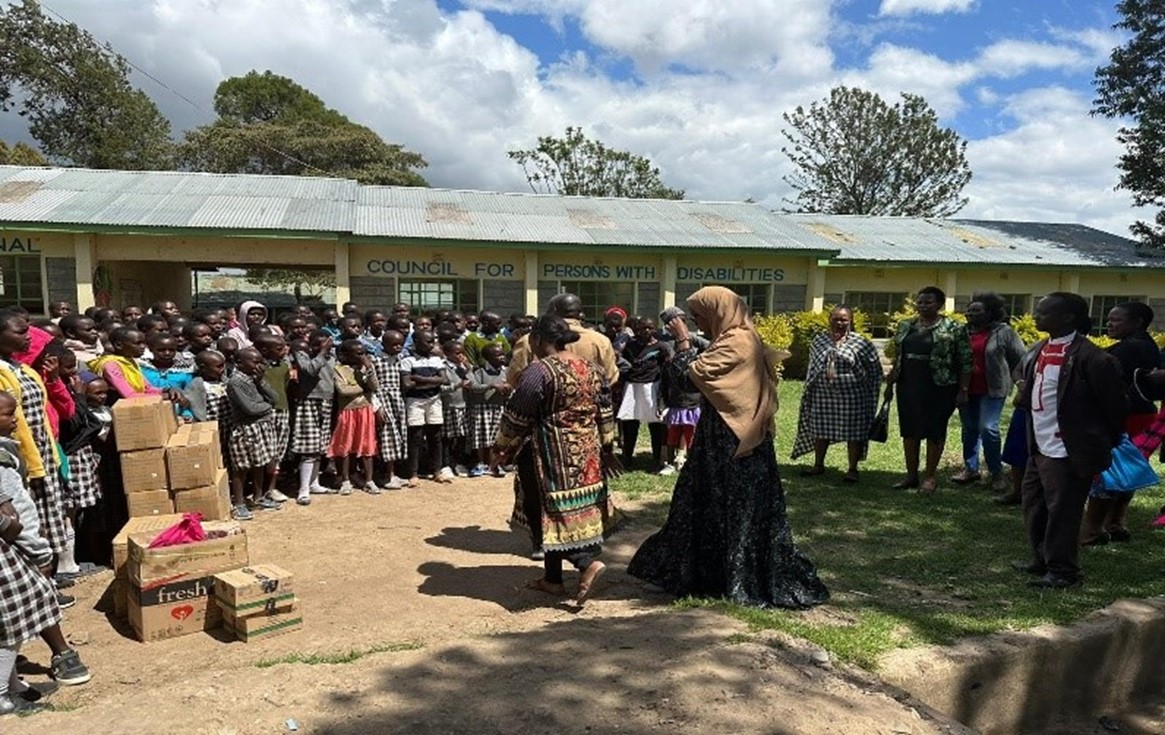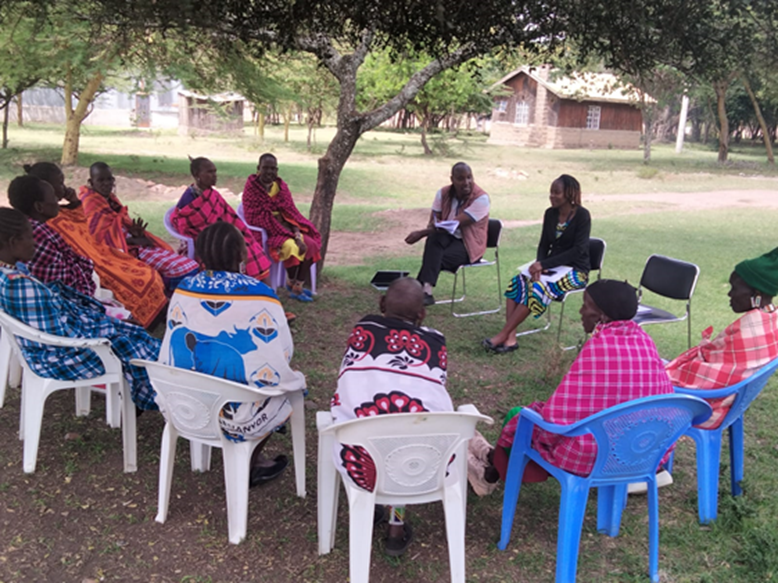Success Story
Increasing Demand and Uptake of Health Services Through a Multigenerational Approach
May 29, 2024
In Narok County, Kenya, sociocultural practices like female genital mutilation (FGM) significantly influence family planning and maternal health outcomes. FGM is considered a rite of passage and a symbol of maturity, and those who undergo FGM are seen as ready for marriage regardless of how old they are. Young women who have undergone genital cutting are considered more desirable for marriage and command a higher dowry payment, thus creating a financial incentive for poor families to maintain the practice. These sociocultural norms contribute to high incidences of early marriage and teen pregnancy.
In the Maasai culture, a girl who has experienced her first menses is not expected to share a roof with her parents, particularly her father, because she is perceived to be ready for marriage. During puberty, girls have a personal responsibility to find a place to shelter in the evenings. Often, they find these shelters outside their homesteads. Because they do not share a home with their parents at night, teenagers are exposed to sexual encounters earlier in their lives, further putting young girls at risk of unplanned pregnancies. Once a girl becomes pregnant, her chances of completing school go down, perpetuating the high rates of illiteracy among girls and women as compared to their male counterparts. A low uptake of family planning tools creates a cycle in which early marriages, teen pregnancy, and low literacy rates limit girls and women from realizing their full potential.
In order to increase the uptake of family planning and maternal health services in Narok County, NPI EXPAND took a multigenerational approach, including members of the community from differing age groups. This type of approach is necessary to address these deeply rooted socio-cultural practices, beliefs, and attitudes (Susana Villas-Boas, 2015) because working on a single age cohort will not be sufficient to address deeply rooted norms. A social behavior change strategy was developed in collaboration with local civil society organizations and the government. Different audiences and their varying needs were identified and catered to, allowing for targeted communication across generations. Regardless of age, there was standardized messaging on integrating gender, health, and environmental issues.
Reaching Students in Places of Learning

A school session sharing reproductive health education information and distributing sanitary towels
NPI EXPAND and local partners saw schools as an opportunity to engage both boys and girls in primary education and designed a school-based intervention to increase adolescent reproductive health education. Teachers were trained on how to run health and environment clubs in schools, through which information about reproductive health was shared with students. Part of the information shared during the school sessions was menstrual hygiene management information, followed by the distribution of sanitary towels to the girls. The Narok County First Lady, Mrs. Agnes Ntutu, participated in some of the school sessions. Parents were also educated on the need to be more involved in supporting their children, particularly girls, to mitigate the various vulnerabilities that they face. Parent-youth forums were proposed to give young people a space to discuss these important issues with the adults in their lives.
Out of School Youth
Although schools are a great place to reach children, not every child is able to take advantage of the opportunity to get an education. Along with unplanned pregnancies disrupting education, another major barrier for girls accessing primary schooling is distance. The long distances from most homes to schools and the nomadic nature of the Maasai community can lead to delays in school enrollment or the complete inability to access education, which in turn exposes girls to FGM and early marriage. Boarding schools often act as a safe haven for young girls, and those who are unable to go to boarding school are forced to run away from home to escape FGM and the risk of early exposure to sex which could lead to an unplanned pregnancy. Longer term strategies to address FGM include sensitization in community forums, inclusion of more women in conservancy child protection committees and advocacy by the first lady against the practice.
NPI EXPAND’s local partners engaged out of school youth in a number of ways, including peer forums to educate teen mothers on family planning and maternal health. Increasing the education of a group of teen mothers allows them to go on and share their knowledge with other youth. Additionally, groups of youth that identify as Mazingira (Environment) Ambassadors for Change used participatory theatre to reach out to the community and share essential family planning and maternal health information to prompt discussions on potentially negative socio-cultural practices and how to combat them.
Young men and women, with the support of NPI EXPAND Kenya, have been sensitized and trained as champions for family planning, maternal health, and gender, with a focus on anti-FGM practices. Most of these young men and women, attending post-secondary education (colleges and university and technical training institutions), are now champions of change and recognize their role in helping to address negative social practices like FGM. Young men have organized themselves into groups to ensure that young girls have specific homes they can go to where they know they’ll be safe from abuse at the hands of other community members. These champions embrace the use of family planning practices and hospital deliveries.
Women of Childbearing Age and Traditional Birth Attendants

Traditional birth attendants discussing family planning and maternal health issues with health workers in a facility
Although women of childbearing age understand the need to space out their pregnancies, they also often confess that they have little to no control over when they become pregnant. Culturally, it is the man’s prerogative to decide on women’s reproductive health issues, leaving women with little say in the matter. Once a woman is visibly pregnant, her husband stops engaging sexually with her until she gives birth, but many mothers also conceive again shortly after because they do not use any form of family planning post-delivery. NPI EXPAND recognized the importance of family planning education and interventions among women of childbearing age. The project educated traditional birth attendants (TBAs) and health workers to provide this information to women.
TBAs are elderly women in their fifties and sixties that are respected and trusted caregivers and birth assistants for women. NPI EXPAND designed an intervention specific to TBAs because of the importance of their role in local communities both culturally and medically. TBAs were sensitized on the need for an increased uptake in family planning and the importance of antenatal care (ANC) and hospital deliveries. Additionally, they were equipped with Ministry of Health-approved guidelines and information on lactation, nutrition, and general health to share with new mothers. Because TBAs play such an important cultural role in communities, it was essential to engage them to ensure they also play a role in promoting safe and facility-based deliveries. TBAs became champions of progressive family planning and maternal health practices, and their insights are well received by men in the community because of the traditional power that TBAs hold. As a result, they play a critical role in influencing both men and younger men.
Encouraging Open Dialogue
Due to the patriarchal nature of the land ownership system in the conservancies in Narok County, men and boys make up the majority of the listed beneficiaries from land leases. These conservancies are tasked with allocating public or community land to amenities, including hospitals, so it is essential to engage with them in order to ensure access to healthcare.
A variety of champions were trained to represent conservancy groups and opinion leaders. Each of the champions was entrusted to conduct male-only dialogues within the conservancies, with the goal of facilitating a free and open discussion on family planning and maternal health, and to motivate some commitments to improve family planning and maternal health outcomes. Goat-eating discussions were particularly useful, because the male participants are culturally bound to implement resolutions through these discussions. Conservancy leaders were identified as champions to be engaged by the project because they can make decisions concerning both individual household and community-wide resources to influence the uptake of family planning and maternal health. As such, rangers were sensitized on family planning and maternal health issues so they could share said information as they undertake their routine conservation work. Specifically, the Maasai Mara Wildlife Conservancies Association, a local environmental organization, was selected for collaboration due the high level of trust that already exists between the community and this organization (USAID, 2018).
Lessons Learned
Throughout the implementation process, many lessons were learned that NPI EXPAND and other similar initiatives can use in the future. A listening tour was conducted prior to the project’s implementation which enabled the identification of interventions that could be group-specific, and ones that could also be interrelated. The purpose of the listening tour was to collect qualitative data by engaging with different stakeholders to share their lived experiences. The different stakeholders included women of childbearing age, conservancy leaders, out of school youth, young girls in schools, and health care workers in different facilities.
Many lessons came from the parent and youth forum sessions as well. For example, for discussions about family planning and maternal health, it is more beneficial to have the same gender groups engaging in conversations as opposed to having youth of both genders and mixed groups of parents. Additionally, these discussions were not very participatory. The parents who did end up attending the forums expressed their preference for attending their socioeconomic activities instead. Future programming should keep in mind that reproductive issues are a sensitive topic and are better addressed among similar age groups., Even when one is implementing a multigenerational campaign, community dialogue and outreach sessions are more effective when one communicates with the different age cohorts in turn.
Trainings and discussions extended to local champions as well, and these educational sessions gave them the tools to share important information with different groups, increasing local ownership and a commitment to make progress toward family planning-related goals. Engaging youth in these meetings required the use of creative mechanisms that allow them to go on to share their knowledge in youth-friendly ways. For example, the use of theatre enables issues that would have otherwise been considered taboo to be discussed more publicly.
Overall, multiple-integration approaches, like the multi-generational approach, have the ability to have a cross-cutting influence, and can have a ripple effect on sociocultural changes in local communities.
References
Susana Villas-Boas, Albertina L. Oliveira, Nátalia Ramos. 2015. “Gender and Intergenerational Programs.” In Gender and Informal Learning of Adults, by Joanna Ostrouch-Kamin´ska and Cristina C. Vieira (Eds.), 121-134. Rotterdam: Sense Publishers.
USAID. 2018. POPULATION, HEALTH, AND ENVIRONMENT AS A BIODIVERSITY CONSERVATION STRATEGIC APPROACH: A synthesis of evidence. USAID.